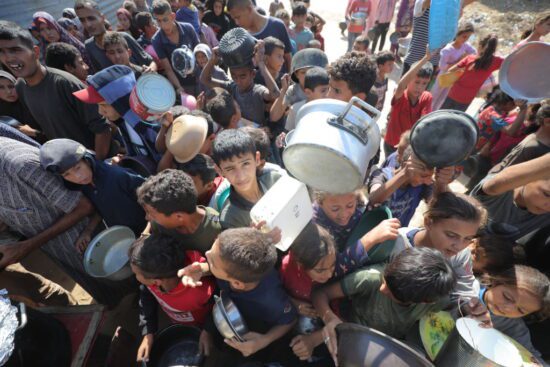Later this week, the Southern Baptist Convention will host an event, SBC Advance, designed to tell “the story of what God is doing through our churches,” according to Ronnie Floyd, president of the SBC Executive Committee. Likewise, SBC President J.D. Greear said the event is designed to remind us of who we are, “a convention of more than 47,500 churches that stand for the Gospel above all and the need to get the message of Jesus Christ to the nations."
This event, I’m confident, is designed at least in part to encourage churches. That’s because life in a pandemic is challenging in and of itself, but perhaps even more so for pastors—who face many of the same challenges as others do but at the same time carry enormous burdens for those they shepherd and the churches they serve. As difficult as this season can be, though, we shouldn’t be surprised when Jesus meets us in our time of need with grace and blessing. And in many cases, that’s exactly what we’ve seen.
At the ERLC, we have the privilege to be in conversation with churches every day. Often, we receive front-row seats to the stories of God’s grace in the lives of local congregations. We get to hear and rejoice with churches who are not only surviving but seeing God move in new and exciting ways. It may be that you’re in a place where you feel weary or empty, uncertain if bad news is lurking around the next corner. It may be that it could be good for your soul to see how God is moving in the midst of this time. If so, allow us to share some of these encouraging stories with you.
Benevolence
One of the most encouraging things we continue to hear from churches is how local congregations are coming together to meet the needs of others in new and exciting ways. Here are a handful of accounts we’ve received in recent days.
- “Our church has given above budget during the season in addition to contributing an extra $600,000 toward mercy ministry. God has blown us away with how He has moved his people to care for each other and our communities. Our people have demonstrated just an overwhelming, and radical kind of generosity toward the people of Austin. At moments it seems the supply is growing faster than the demand.”
- “We have given grants to 43 churches to help them get through the financial crunch. (Over $100k has been used to care for their members. $70k has been used to care for their communities. $82k has been used to support their operational budgets).”
- “We have had group members buy other group members plane tickets to go out of state to take care of elderly family members. We have had numerous families step up for the sick, buying them groceries, etc. We've had people give money to others within the church.”
- “One local family had their house burned down, and a church member close to them became a collection point for supplies. They were overwhelmed with support from our church and community.”
Community
Churches continue to share with us stories of pastors knowing their people’s gifts and seeking to mobilize them to meet needs. They have also recounted how many of their people were already serving, whether sewing masks, donating supplies, delivering meals, or checking in on the isolated and vulnerable.
- “We ministered among the crisis with a care team, and this early decision to start up a care team has proved to be the ballast in the ship. They have provided critical member care and consistent contact in a way that the pastoral staff could not (one of their requirements is to call the people in their charge at least 1x/wk).”
- “We’ve gathered stories from people in our church (missionaries, individuals, families, baptisms, etc.) to share at the start of live streams and events in order to engage our people and have our church body seen and known as we engage from our living rooms.”
- Many other churches have shared how their staff have made a point to check in with each member of the congregation every week to see how the church could serve them, pray for them, and make sure they were holding up.
- Other churches have arranged drive-by greetings, where church staff or members organize trips to drive up to other members’ homes to say hello. In other cases, small groups have gathered in mini-parades to go encourage someone else in the congregation.
- Some churches in university towns have reversed college life a bit, sending care packages from the college town back to their students’ homes, wherever it is they’ve returned to.
- Many churches have devoted special attention to the senior adults in their congregations, whether by arranging volunteers to coordinate and deliver groceries, letter-writing, delivering masks to all seniors within a congregation, and making a point to maintain regular contact.
- In some cases, the community has come in the context of grief: “Our student leader's wife's father unexpectedly passed away during the crisis on the due date of the student leader's first child. The church has provided meals, care packages, calls, emails, texts, prayers, and more, and this family has repeatedly given thanks to God for the gift that is the body of Christ in these days where sorrow and joy come to meet. “
Ministry opportunities
Ministry needs often arise in response to unforeseen circumstances, and a pandemic certainly qualifies. Here are some of the encouraging ministry advances we’ve heard of just over the last few weeks.
- “We did a “Fill the Truck” day to fill up a truck with food for our faith centers in which we give food to people who need it. We have given out over 700 times the amount of food than we normally do during this pandemic.”
- In some cases, churches report that schools have contacted churches to ask if they would be distribution points for food and families dependent on the school lunch program.
- Many churches have partnered with agencies such as our own SBC Disaster Relief or other groups like Meals on Wheels or local food pantries to join together to serve their communities.
- One church came together to purchase food for three months for a village in Kenya. Another gathered nearly 14,000 pounds of food to be given away locally. Another donated $30,000 worth of meals through a local restaurant owned by a church member who turned his restaurant into a “meals on wheels” to care for those in need. Another church reported to us that they helped feed over 15,000 people in the midst of this pandemic, including many in their city with whom they might never have otherwise come into contact.
- One church was able to partner with the local school system to help them host a drive-in graduation for high school seniors, leaving the school system thrilled that a church would be able and willing to work with them to honor graduating seniors at this important moment in their lives.
Relief efforts
Again and again, Southern Baptists show that when disaster and danger strike, they’ll be the first on the ground to help and the last to leave. Not surprisingly, the same has shown itself to be true in the midst of this pandemic. Here are a few stories we’ve heard along these lines:
- One couple is Tulsa, Oklahoma, worked with others to ship more than 10,000 masks to Hong Kong.
- One church in China sent 1,000 masks to the U.S., which have been distributed in a local community.
- Other churches have utilized money that would have been used toward summer mission trips, which are necessarily cancelled due to public health requirements, and used those instead to purchase disinfectants to donate to hospitals and serve health care workers in short supply.
- One church recounts that their local congregation has “been able to serve over twelve hospitals, providing over a thousand meals for healthcare workers. One member, owner of a furniture business, ceased production of furniture and began using equipment to provide masks for homeless and asylum seekers on the border. We have funded the production of nearly 50,000 masks and have become the leading local provider of personal protective equipment.”
- Another church shares: “Our Missions department has enabled our people to continue to serve our community partners while abiding by the CDC guidelines. We have distributed food baskets as well as blessing bags (with food items, gospel tracts, and a hand-written note of encouragement) to our medical workers. In May we are taking donations, sorting and bagging blessing bags for 15,000 medical workers in the hospitals in and around the community. Some of our members have organized prayer parades that circle our hospitals and hold signs letting them know they are being prayed for."
Nashville-area pastor Scott Sauls recently noted how “long term changes necessary to lead in an environment will probably require a certain level of sensitivity to this virus for quite some time.” If that’s true, and a “return to normal” is further into the future than we might hope, our hope is that stories like these might be a small encouragement and reminder of God’s mercy and the power of his Spirit in the lives his people.










